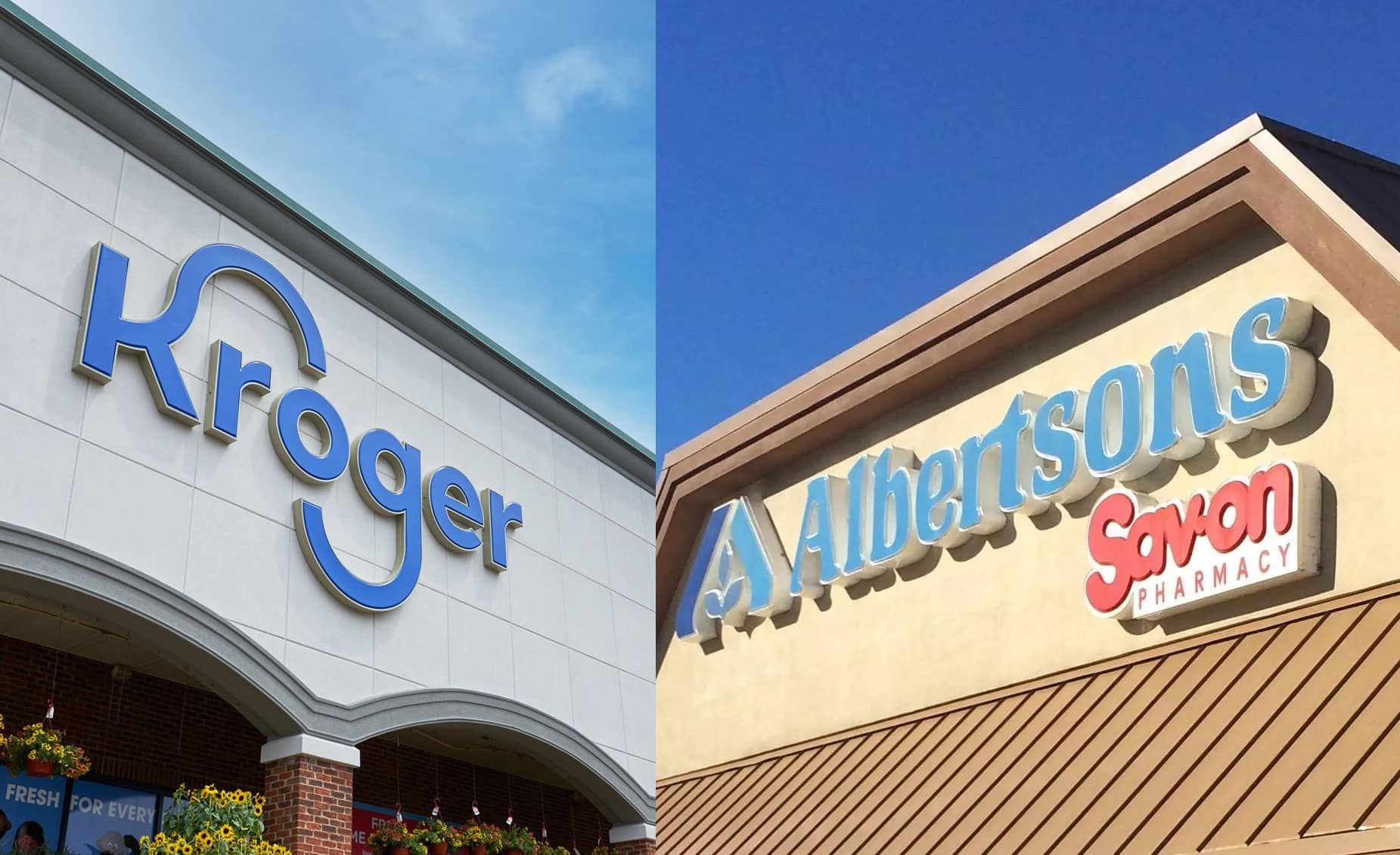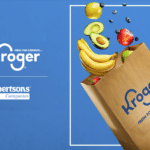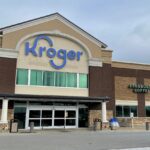
In a widely-expected move, federal regulators – joined by nine states – are suing to block Kroger’s planned acquisition of Albertsons, calling the proposed combination “anticompetitive” and bad for shoppers and employees alike.
The Federal Trade Commission has announced a lawsuit challenging what would be the largest supermarket merger in U.S. history, 16 months after the $24.6 billion deal was announced.
The FTC points out that a combined Kroger-Albertsons would consist of more than 5,000 stores with nearly 700,000 employees across 48 states. This would “eliminate fierce competition,” the agency alleges, “leading to higher prices for groceries and other essential household items,” as well as “lower quality products and services” and fewer “choices for where to shop.” It would also “erase aggressive competition for workers,” harming current and potential employees.
Attorneys General from Arizona, California, the District of Columbia, Illinois, Maryland, Nevada, New Mexico, Oregon and Wyoming are joining the federal lawsuit, which comes on the heels of independent lawsuits already filed by the states of Washington and Colorado.
The FTC’s case echoes some of the complaints made by those earlier lawsuits, stating that both retailers have acknowledged privately that they are “direct competitors, forcing each other to aggressively compete for customers by lowering prices, and for employees by providing better pay and benefits across the country.” The FTC also cites the same internal document cited in Washington state’s lawsuit, in which an Albertsons executive responded to news of the potential deal by observing that “you are basically creating a monopoly in grocery with the merger.”
The case goes on to detail what it says would be the negative impact on consumers, on employees, and on the combined grocers’ proposed new competitor, which the FTC alleges would not make for much of a competitor at all.
For consumers, the impact is more than just about prices. The FTC claims the retailers’ merger “would also diminish their incentive to compete on quality.” As competitors, Kroger and Albertsons try to outdo each other with “fresher produce, higher quality products, improved private label offerings, a broader array of in-store services, flexible store and pharmacy hours, and curbside pickup services.” A merger would eliminate this competitive effort at continual improvement, the agency alleges. As a result, “grocery prices will increase, and Kroger and Albertsons’ incentive to improve product quality and customer service will decrease.”
For employees, a combined Kroger-Albertsons “would gain increased leverage over workers and their unions,” allowing them to “slow improvements to wages, worsen benefits, and potentially degrade working conditions.” In some markets, such as Denver, the combined company would become the only employer of union grocery labor, weakening workers’ negotiating position.
And the FTC lawsuit takes particular aim at Kroger and Albertsons’ proposed remedy to maintain competition – their plan to divest hundreds of stores to C&S Wholesale Grocers. C&S is largely a supplier to grocery chains and not much of a grocery operator itself. It currently operates less than two dozen grocery stores, but plans to purchase more than 400 Kroger and Albertsons stores in markets where there is significant overlap. Kroger and Albertsons say this is to maintain a competitive grocery environment so their combined company is not the only grocery operator in town. But the FTC expresses serious concern that the plan is doomed to fail.
The “inadequate divestiture proposal is a hodgepodge of unconnected stores, banners, brands, and other assets that Kroger’s antitrust lawyers have cobbled together,” the FTC alleges. C&S “would face significant obstacles stitching together the various parts and pieces from Kroger and Albertsons into a functioning business — let alone a successful competitor.” The agency also complains that the proposal “completely ignores many affected regional and local markets where Kroger and Albertsons compete today,” and says the plan “falls far short of mitigating the lost competition between Kroger and Albertsons,” assuming that C&S would even be able to “survive as an operator.”
Kroger reacted forcibly to news of the lawsuit, echoing its statement from two weeks ago, in which it said a merger would result in exactly the opposite situation from what the FTC alleges. “Blocking Kroger’s merger with Albertsons Companies will actually harm the very people the FTC purports to serve: America’s consumers and workers,” Kroger said in a statement. “Kroger has a proven track record of lowering prices so more customers benefit from fresh, affordable food, and our proposed merger with Albertsons will mean even lower prices and more choices for America’s consumers.” Kroger went on to say that it, and Albertsons, “look forward to litigating this action in court so we can deliver the benefits of this merger to communities across America.”
In a separate statement, Albertsons accused the FTC of using “the same outdated view of the U.S. grocery industry it used 20 years ago,” saying that the agency’s opposition to the deal “would be hurting customers and helping strengthen larger, multi-channel retailers such as Amazon, Walmart and Costco – the very companies the FTC claims to be reining in – by allowing them to continue increasing their growing dominance of the grocery industry.”
The FTC, though, maintains its opposing viewpoint. “This supermarket mega merger comes as American consumers have seen the cost of groceries rise steadily over the past few years,” Henry Liu, Director of the FTC’s Bureau of Competition, said in a statement. In addition to harming employees, “Kroger’s acquisition of Albertsons would lead to additional grocery price hikes for everyday goods, further exacerbating the financial strain consumers across the country face today.”
In making their merger announcement back in October 2022, Kroger and Albertsons anticipated the deal would be complete by now. Instead, after 16 months of discussion and debate about the pros and cons of the move, it appears the real fight is just getting started.
Image sources: Kroger/Albertsons










